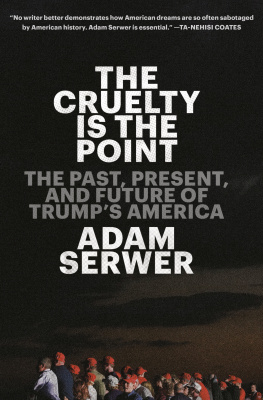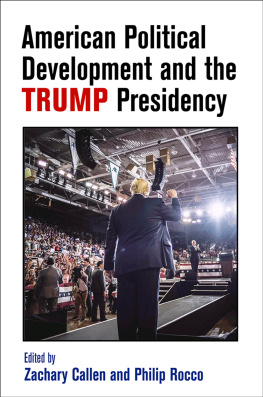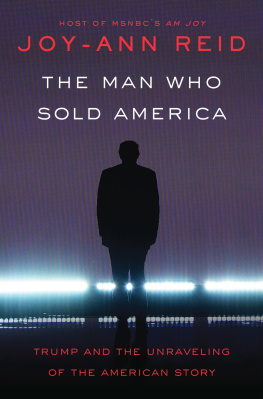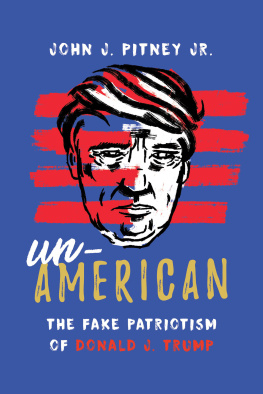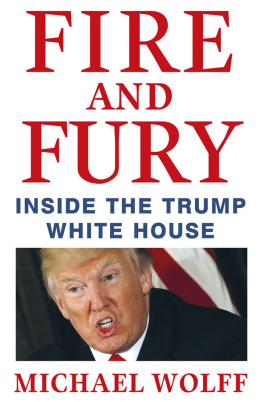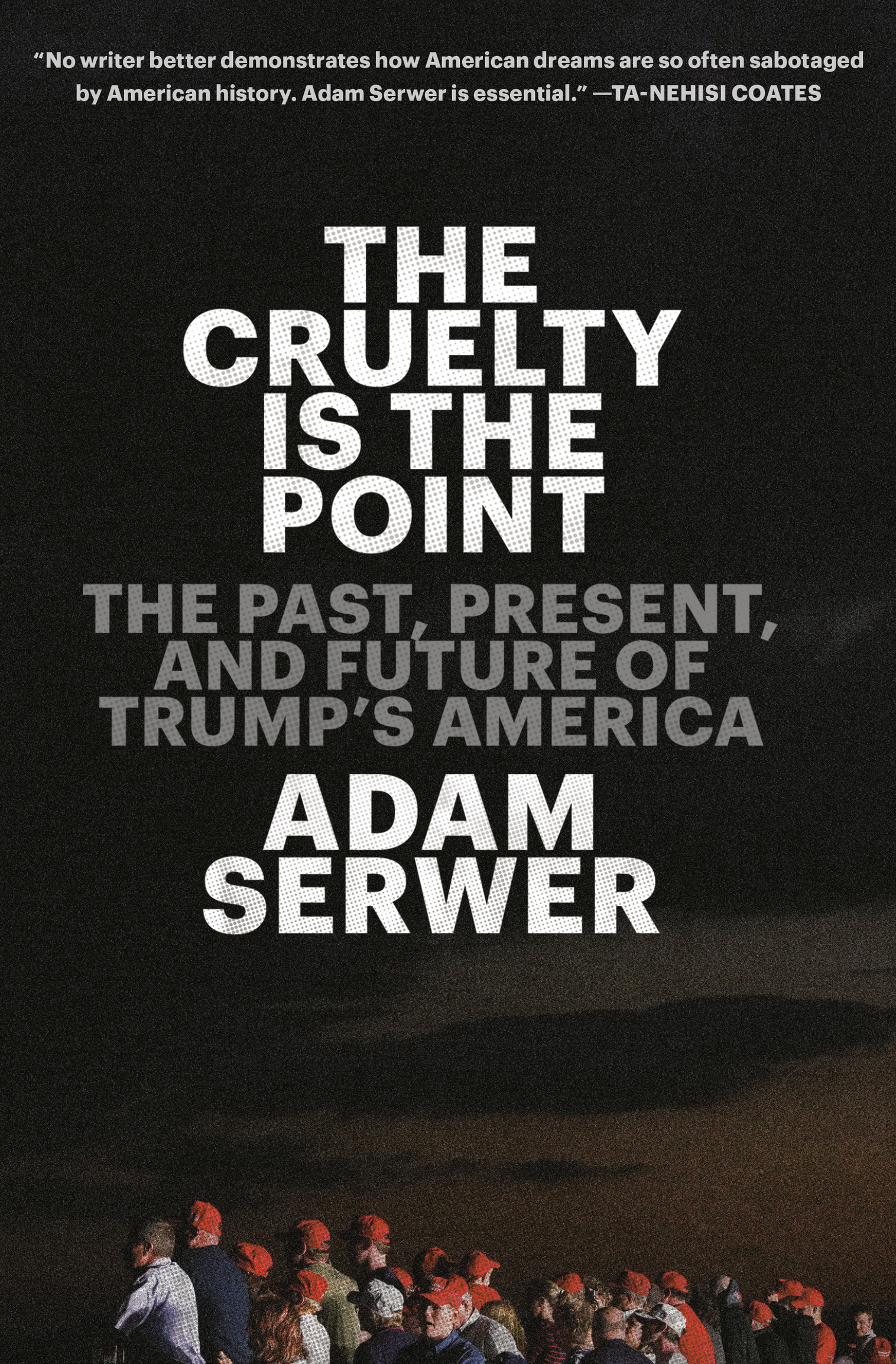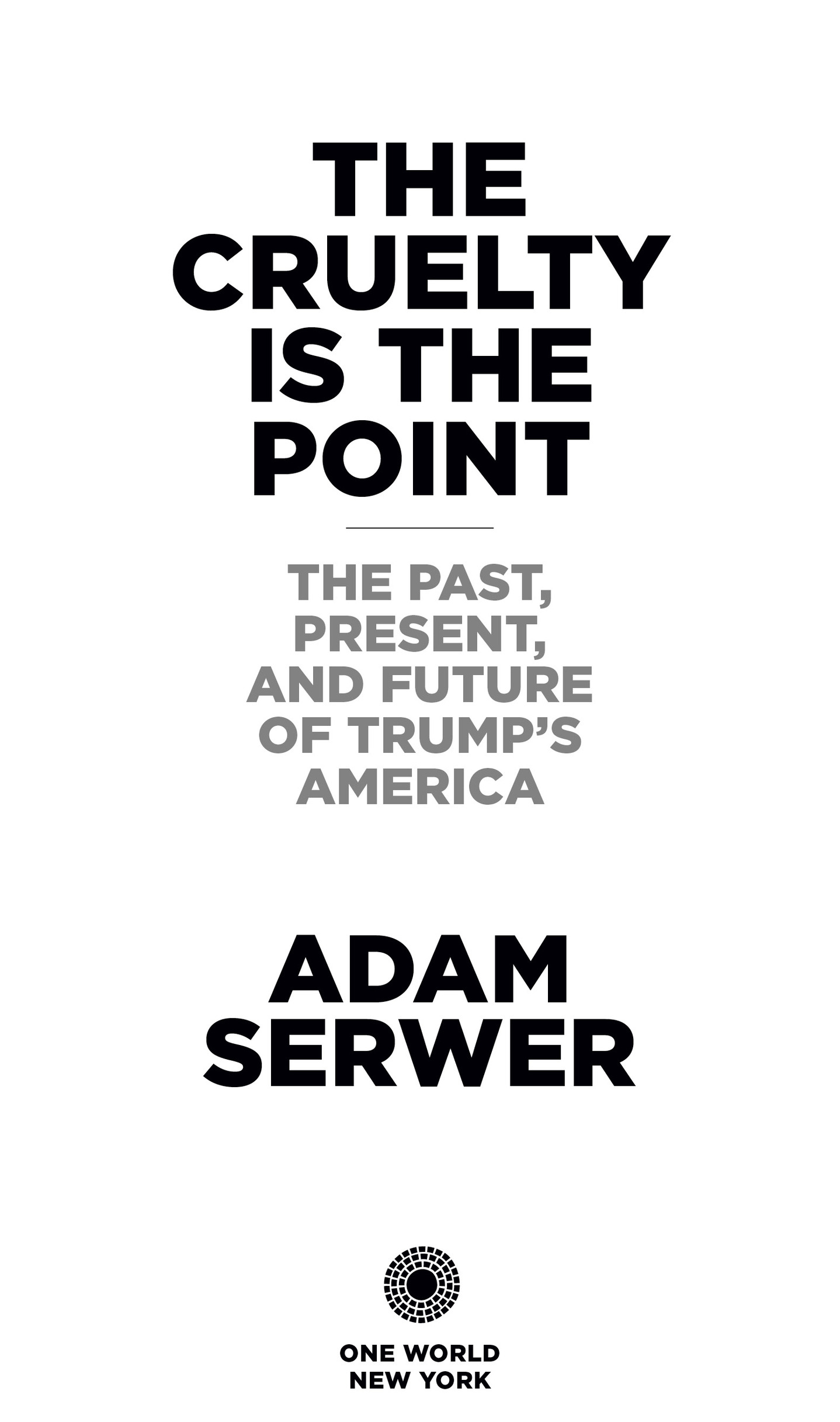Contents
Landmarks
Print Page List
Copyright 2021 by Adam Serwer
All rights reserved.
Published in the United States by One World, an imprint of Random House, a division of Penguin Random House LLC, New York.
One World and colophon are registered trademarks of Penguin Random House LLC.
Grateful acknowledgment is made to The Atlantic for permission to reprint the following essays by Adam Serwer: Is This the Second Redemption? (The Atlantic, November 10, 2016), 2016 The Atlantic Monthly Group LLC; The Myth of the Kindly General Lee (The Atlantic, June 4, 2017) and The Nationalists Delusion (The Atlantic, November 20, 2017), 2017 The Atlantic Monthly Group LLC; Why Tamika Mallory Wont Condemn Farrakhan (The Atlantic, March 11, 2018) and The Cruelty Is the Point (The Atlantic, October 3, 2018), 2018 The Atlantic Monthly Group LLC; White Nationalisms Deep American Roots (The Atlantic, April 2019), What We Do Now Will Define Us Forever (The Atlantic, July 18, 2019), and Civility Is Overrated (The Atlantic, December 2019), 2019 The Atlantic Monthly Group LLC; The Coronavirus Was an Emergency Until Trump Found Out Who Was Dying (The Atlantic, May 8, 2020) and The New Reconstruction (The Atlantic, October 2020), 2020 The Atlantic Monthly Group LLC. Reprinted with permission of The Atlantic.
Library of Congress Cataloging-in-Publication Data
Names: Serwer, Adam, author.
Title: The cruelty is the point: the past, present, and future of Trumps America / Adam Serwer.
Other titles: Past, present, and future of Trumps America
Description: First edition. | New York: One World, [2021]
Identifiers: LCCN 2021001751 (print) | LCCN 2021001752 (ebook) | ISBN 9780593230800 (Hardback; acid-free paper) | ISBN 9780593230817 (eBook)
Subjects: LCSH: RacismPolitical aspectsUnited StatesHistory21st century. | United StatesRace relationsPolitical aspectsHistory21st century. | Anti-SemitismPolitical aspectsUnited StatesHistory21st century. | Trump, Donald, 1946 Political and social views. | CrueltySocial aspects. | Communication in politicsUnited StatesHistory21st century. | United StatesPolitics and government2017
Classification: LCC E185.615 .S395 2021 (print) | LCC E185.615 (ebook) | DDC 305.800973/0905dc23
LC record available at lccn.loc.gov/2021001751
LC ebook record available at lccn.loc.gov/2021001752
oneworldlit.com
randomhousebooks.com
Book design by Susan Turner, adapted for ebook
Cover design: Greg Mollica
Cover image: Peter van Agtmael/Magnum Photos
ep_prh_5.7.0_c0_r2
Contents
The negro still hopes that some day the United States will become as great intellectually and morally as she is materially, to protect and honor all her citizens regardless of race, color, or previous condition, and thus make her professions a living reality.
Ida B. Wells , May 28, 1894
A NOTE TO THE READER
Throughout this book, I use lowercase when referring to racial terms such as black or white. This is against the prevailing trend in letters, but I do it because I fear that capitalization reinforces the notion that race is a biological reality rather than a social reality. Racism and bigotry are very real, but race itself is a biological fiction.
INTRODUCTION
PROMISES MADE, PROMISES KEPT
The day Donald Trump descended the golden escalator in Trump Tower in 2015 to announce his presidential campaign, he made a lot of promises. He said he was going to rebuild our infrastructure, our bridges, our roadways, our airports. He insisted that he would save Medicare, Medicaid, and Social Security without cuts. He would reduce our eighteen trillion dollars in debt. The Affordable Care Act would be repealed and replaced with something much better for everybody. He promised to be the greatest jobs president that god ever created. Americas politicians were controlled fully by the lobbyists, by the donors, and by the special interests, fully. But Trump would not be controlled.
The media at the time covered the speech with headlines like The Ten Best Lines from Donald Trumps Announcement Speech and The Best Moments from Donald Trumps Announcement Speech . An article in Politico gushed that its hard to pick just ten. The Huffington Post announced it was relegating coverage of Trump to its entertainment section. After all, this was the birtherism spouting host of The Apprentice, a reality show star the sitting president had dismissed as a carnival barker. There was no way that Trumps overt bigotryhis demonizing of Latino immigrants as violent criminals and Muslims as terrorists, his caustic misogyny toward any woman with the temerity to criticize himwould fly in a nation that had just elected a black president, no matter what he was promising.
A lot of very smart people treated Trump like the whole thing was a big joke. At the time, I was at the BuzzFeed News offices in New York City, standing around a television screen tuned to CNN with my colleagues. The grotesque tone of the Trump years was still new and hard to describe. Later, my colleague John Stanton, a tall, tattooed former bouncer who is as kind as he looks tough, said to me after attending a few of Trumps rallies, I think hes going to be president.
I was doubtful at the timeremember, this was before Trump steamrolled a bunch of guys who generated a years worth of magazine cover stories on the next Republican presidentbut what Stanton said stuck with me. Win or lose, the dust Trump was kicking up would linger in the lungs. I started poring over old texts about racism, immigration, and nativism, like John Highams Strangers in the Land. I found disturbing echoes of Trumps rhetorical style in Hannah Arendts description of Stalinist and Nazi apparatchiks in The Origins of Totalitarianism and had epiphanies about the fragility of American democracy reading W.E.B. Du Boiss Black Reconstruction in America. Over the course of his presidency, I would write dozens of essays that drew on that history for The Atlantic, essays in which I tried to show how the ideological currents of the past had shaped the present. The realization dawned that Trump, win or lose, was summoning to the fore the most treacherous forces in American history and conducting them with the ease of a grand maestro.
But could he win a Republican primary? For the previous eight years, the GOP had piously espoused their small-government fiscal conservatism in opposing Barack Obama, and here was a foul-mouthed, bombastic television personality who had a documented history of liberal policy positions on certain issues and no record of conservative achievement. Republican eliteselected officials, right-wing intellectuals, ambitious staffersdenied that this heretic preacher could captivate their supposed small-government flock with the gospel of white identity politics.
They were wrong. They were wrong because they misunderstood their own base and the potency of Trumps appeal to a theme that would emerge more distinctly later in his general election campaign, the rigged system. Trump adviser Roger Stone urged Trump to espouse two simple claims: that the system is rigged against the citizens and that, unlike other politicians, he cannot be bought. These themes were specific enough to be evocative but vague enough to be misinterpreted. The rigged system was one thing to Trump supporters and another to many of the reporters, analysts, and intellectuals tasked with understanding what it meant.

